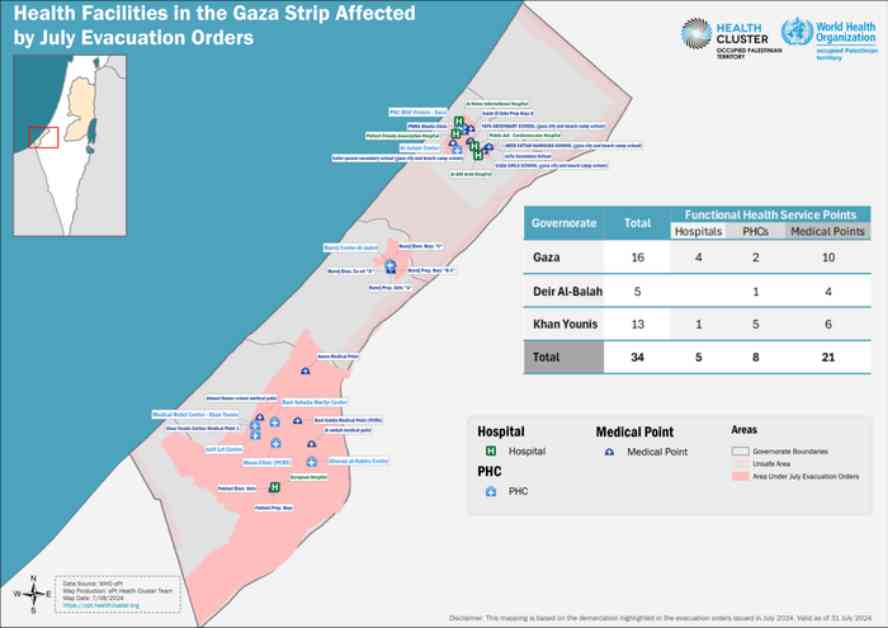Impact of July Evacuation Orders on Health Facilities in Gaza Strip
In the midst of escalating conflict and violence in the Gaza Strip, the month of July brought about a series of evacuation orders that had a significant impact on health facilities in the region. As the United Nations Office for the Coordination of Humanitarian Affairs (OCHA) worked to coordinate emergency response efforts, the repercussions of these evacuations on the already strained healthcare system became increasingly apparent.
Challenges Faced by Health Facilities
The evacuation orders issued in July forced several health facilities to shut down or relocate, disrupting vital services and putting the health and well-being of thousands of civilians at risk. Hospitals and clinics were either damaged or rendered inaccessible due to the ongoing conflict, leaving many without access to essential medical care. The limited capacity of remaining health facilities to accommodate the influx of patients further exacerbated an already dire situation.
Dr. Ahmed, a physician working in one of the affected hospitals, expressed his concerns about the impact of the evacuation orders on the healthcare system. “We are overwhelmed with the number of patients seeking treatment, and our resources are stretched thin,” he stated. “The closure of health facilities has made it even more challenging to provide adequate care to those in need.”
Humanitarian Response Efforts
In response to the escalating crisis, OCHA mobilized resources and coordinated with various humanitarian organizations to provide much-needed support to the affected health facilities. Emergency medical supplies, including medications, surgical equipment, and other essential items, were distributed to ensure that healthcare providers could continue to deliver critical services to those in need.
Furthermore, OCHA facilitated the deployment of additional medical personnel to assist local healthcare workers in managing the increased patient load. The collaboration between international and local healthcare professionals played a crucial role in ensuring that medical services remained available despite the challenges posed by the evacuation orders.
Long-Term Implications
The impact of the July evacuation orders on health facilities in the Gaza Strip is likely to have long-term implications for the region’s healthcare system. The disruption of medical services, coupled with the physical damage inflicted on healthcare infrastructure, will pose significant challenges in the months and years to come.
As the conflict continues to escalate, the need for sustained support and resources for health facilities in the Gaza Strip remains critical. OCHA and its partners are committed to working together to address the immediate and long-term health needs of the population, but the road ahead is fraught with obstacles that will require ongoing collaboration and commitment from all stakeholders involved.
In conclusion, the evacuation orders issued in July have had a profound impact on health facilities in the Gaza Strip, highlighting the urgent need for continued humanitarian assistance and support. The resilience and dedication of healthcare workers in the face of adversity serve as a reminder of the importance of upholding the right to health for all individuals, even in the most challenging of circumstances.




















